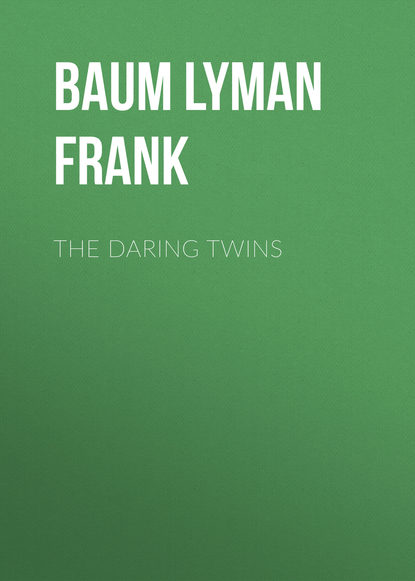По всем вопросам обращайтесь на: info@litportal.ru
(©) 2003-2024.
✖
The Daring Twins
Настройки чтения
Размер шрифта
Высота строк
Поля
“I know; but in spite of that I’ve a queer feeling – a sort of suspicion – that he’s playing us a trick.”
“Have you, Phil? But why?”
“I can’t explain it. You see, since Boothe has been away Eric has been free to do as he pleased. He’s in desperate need of money, just now; but, although I’ve been on the watch, not a single crooked transaction have I been able to discover – except one.”
“What was that?”
“I found on his desk yesterday a scrap of paper with my name scribbled over it in many styles of handwriting. Anyone seeing it would have thought I had been trying to create a lot of different signatures. I tore the paper in two, crumpled it up, and tossed it in the waste basket. But, afterward, I decided the thing ought to be burnt, and searched for the scraps. They weren’t among the other papers, for I went through the entire contents of the basket. Some one had taken them, and it could be no one but Eric.”
Phœbe looked grave at this.
“What does it mean, Phil?”
“I’ve tried to think. I know of two or three forged deposit slips, aside from that one of Mr. Martin’s. Then there was the forged check of Mrs. Randolph – I’m positive it was forged. These things are sure to be discovered some day, and then the charge of forgery and embezzlement will lie between Eric and me.”
“Oh, Phil!”
“As Eric is Mr. Spaythe’s own son it will be easy for him to accuse me. If I tell Mr. Spaythe what I know he will ask why I didn’t report it at the time. I’m in a net, Phœbe, and Eric knows it. If he can save himself at my expense, he won’t hesitate.”
“I see!” she cried, clasping her hands tightly. “Isn’t it dreadful, Phil?”
“That is why I now suspect that Eric is up to mischief. It surprised me that he told his father so bluntly he was going to St. Louis. It would be better policy for him to keep quiet about the trip; but he risked Mr. Spaythe’s anger with unusual boldness. And he took pains to advertise his going to the whole town – even to let people see him ride away in the train.”
“What could be his object?” inquired Phœbe, much perplexed.
“To be able to prove an alibi, I imagine.”
The twins walked on in silence for a time and were just passing the railway station when Phil had an idea.
“Come in with me,” he whispered, and followed by Phœbe he walked calmly up to the agent’s window. The man was not busy, as no trains were due at this time.
“Hello, Wakefield,” called Phil, genially.
“Hello, Phil. Good evening, Miss Daring,” responded the agent, recognizing them.
“I came in to pay for Eric’s ticket to St. Louis. He happened to be short of currency, but said you’d let him have the ticket, and I could drop in and settle for it to-night.”
Wakefield seemed surprised.
“Mr. Spaythe didn’t buy a through ticket,” he explained. “He only took one to Canton. Said he’d buy his ticket and sleeper from there on. I remember thinking that was a queer way to do. If he was short of money, Eric knew I’d help him out.”
Phœbe trembled as she pressed Phil’s arm.
“Why, it’s all right, then, Wakefield,” said Daring, calmly. “Probably he changed his mind, and in that case I don’t owe you anything.”
“Not a cent. Good night, Phil. Good night, Miss Daring.”
“Good night,” they answered and walked away.
“You see, I was right,” said the boy, when they were on the street again. “Canton is only ten miles away, and Eric plans to leave the train there and come back.”
“When?”
“Some time to-night. He means to rob the safe and get away with the money. That will implicate me, you see, as I’m the only one except Mr. Spaythe and Boothe that knows the combination – and the cashier is sick in bed.”
“Oh, Phil! I’m sure your suspicion is too horrible to be true.”
“Why, it’s so simple that it must be true. Under the circumstances it is the natural thing for Eric to do. He isn’t so very clever, although perhaps he thinks he has laid a deep plot to ruin me. The queer thing about it is that it’s liable to succeed.”
They had reached the bank now. Phil opened the side door and ushered Phœbe into the large back room where he did his work. He turned on the electric lights, pulled down the shades to all the windows and then opened the safe and got out the books. Phœbe, perched upon Eric’s vacant stool, watched him thoughtfully. Her face was pale as wax and she had nervous, trembling fits that she could not control.
“I’m glad I am with you,” said she, presently. “If you are accused, I can swear you did not touch the money.”
Phil bent over and kissed her, but made no reply. Putting all his mind upon the books he methodically pursued his work for an hour or so, until all the entries had been made and his task finished. Then he closed the ledgers with a sigh of relief, put them away, and locked the safe.
“Who knows,” he said, turning to Phœbe with a wan smile, “but that this is the last bit of work I shall do for Spaythe’s Bank? If my suspicions are correct, on Monday morning the safe will be found to have been robbed, and then I must face accusations and probable disgrace.”
By this time the girl had recovered most of her composure. She was still pale, but had been busily thinking during that tedious hour, trying to find some way to save her twin brother.
“Do you know exactly how much cash is in that safe now?” she asked.
“Of course, Phœbe. It is all entered upon the books, in black and white, and Mr. Spaythe has a copy of the amounts, besides.”
She looked carefully around the room. At the very back of the building, facing the safe, was one window which opened upon an unused yard at the rear. The window was just then covered with a thick shade. Phœbe took the desk shears, walked deliberately to this window, and punched two small holes in the shade.
“What on earth are you doing?” asked her brother, in amazement.
“Phil, we’re going to play we’re detectives, you and I. Go outside, and around to this window, and find out if you can see the safe through the holes I have made. If not, I must make them larger.”
Phil obeyed, still puzzled as to her meaning. When he returned to her, he reported that the holes were about on a level with his eyes, when he stood in the back yard, and that the safe was plainly visible through the tiny openings if one stood with an eye close to the windowpane.
“Very well,” said she, nodding with satisfaction. “What time is it now?”
“Nearly ten.”
“We shall have a long wait, but we mustn’t mind that. Let us go, now.”
Phil waited until she reached the door; then he put out the lights and joined her. As they passed out he locked the door and put the key away in his pocket.
“What now?” he asked.
“Let us take a walk up the street, for a block or two,” she replied, in a whisper; and he followed her obediently. Although it was Saturday night, this part of the town was practically deserted. There was a light in the laundry office across the way and a girl stood in the door of a candy shop and nodded to the twins vacantly. Half a block up the street was the printing office, but the lights in it went out before they reached it, and Mr. Fellows, the editor, gave the Darings a pleasant “Good night!” as they passed by while he was locking the door.
Phœbe crossed over into the next street, which was merely a lane, and turning about began to retrace her steps. Phil clung to her arm and let her lead him. Here there was no light to guide them save the dim glow of the stars. The moon would not be up for some hours yet. They had to feel their way carefully for a time, but ere long they had reached a position in the rear of the bank and entered the unused yard. From a pile of boxes dumped behind a neighboring grocery Phil brought two to serve as seats, for now he guessed Phœbe’s purpose and fully approved the venturesome undertaking.
They sat in silence for a time, their backs against the brick wall of the bank.
“How will Eric get back from Canton?” the girl inquired, musingly.

















